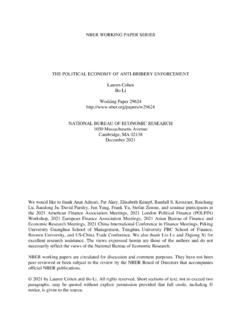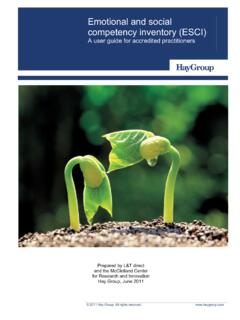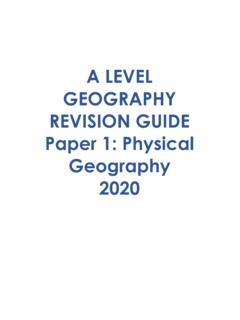Transcription of THE MARSEILLE MANIFESTO
1 THE MARSEILLE MANIFESTO 10 September 2021 THE MARSEILLE MANIFESTO IUCN WORLD CONSERVATION CONGRESS - MARSEILLE 2 THE MARSEILLE MANIFESTO The IUCN World Conservation Congress in MARSEILLE comes to a close in the midst of a global pandemic, and escalating climate and biodiversity emergencies. This exacerbates inequalities within and among countries and reinforces global divides. The climate and biodiversity emergencies are not distinct, but two aspects of one crisis. Unsustainable human activity continues to compound the situation, and threatens not only our own survival but the foundation of life on Earth. We cannot separate ourselves from nature: we are part of nature, and depend upon it for our lives and livelihoods. Our response to these emergencies must be mutually reinforcing. For example, measures designed to address climate change must not lead to further biodiversity loss. Humanity has reached a tipping point.
2 Our window of opportunity to respond to these interlinked emergencies and share planetary resources equitably is narrowing quickly. Our existing systems do not work. Economic success can no longer come at nature s expense. We urgently need systemic reform. Yet there is reason to be optimistic. We are perfectly capable of making transformative change and doing it swiftly. During the global pandemic, we have changed our behaviour to protect our health, and the health of those around us. Fundamental change is again needed if we are to build societies that value, protect, and invest in nature. To invest in nature is to invest in our collective future. The IUCN Congress recognises that we have one nature, one future and so commits to: Respecting and harnessing the perspectives and agency of all citizens especially youth1, the leaders of the future, who constitute almost a fifth of the global population. The rights of indigenous peoples and local communities underpin their central role in conservation, as leaders and custodians of biodiversity.
3 The agency of those who are marginalised, whether economically, socially or politically, including women must be enhanced. IUCN recognises that it is these groups who are most affected by the climate and nature emergencies, and that they also offer innovative solutions to them. IUCN, its Members and partners commit to supporting and strengthening their agency, promoting diversity and inclusivity in leadership and throughout our work. Around the world, those working to defend the environment are under attack. This includes communities and frontline workers like rangers. IUCN commits to work to protect environmental defenders. Further, IUCN urges its Members and partners to use the IUCN Natural Resource Governance Framework to strengthen inclusivity and equity more generally. Pursuing collaboration and partnerships. To find common ground and encourage action, we must embrace diversity of opinion, framed by scientific evidence, and promote teaching and learning.
4 This will allow us to work across disciplines and sectors, and adopt solutions that draw on the widest variety of experience, knowledge and traditions. It is time to broaden our perspectives. More cooperation, especially between countries, is needed to reinforce international and regional efforts. IUCN, as a convener and inclusive, democratic forum, stands ready to facilitate and build partnerships that enhance the capacity of our Members: State, civil society, and Indigenous Peoples Organisation (IPOs). Local action as a powerful tool for change, which complements action at other scales. The Congress commits to fostering a new approach with a meaningful role for all, from grassroots organisations to governments and communities to corporations. Our new approach must recognise everyone s responsibility, and guide them to act for 1 15-24 years old THE MARSEILLE MANIFESTO IUCN WORLD CONSERVATION CONGRESS - MARSEILLE 3 nature and our future.
5 IUCN encourages all citizens to do so wherever they are; be it in cities, farms, at sea, in workplaces, or schools. IUCN Members and partners renew their commitment to work together to address the COVID-19 pandemic and the biodiversity-climate crisis, reaffirming that people and nature are at the heart of our pledges. These crises are destroying the lives and livelihoods of hundreds of millions of people. Countering the impacts of the COVID-19 pandemic: The pandemic makes clear our unsustainable relationship with nature. It amplifies the social, economic, and health inequities within and between societies, and between the Global North and the Global South. The links between people and nature mean that these issues can be resolved together. We need to conserve nature to maintain our own resilience. We must ensure more inclusive and just decision-making as we rebuild from the pandemic. This is an opportunity to recognise the rights and agency of indigenous people and local communities more fully, as set out in the UN Declaration on the Rights of Indigenous Peoples.
6 The Congress encourages governments, civil society, and the private sector to restore a positive relationship with nature and people by: Promoting investments in nature. Governments are now committed to stimulate economies. This generates a unique opportunity to create sustainable jobs, accelerate the just transition to a low carbon and sustainable blue economy, respect and engage communities, especially indigenous people and youth, end harmful investments and redirect them towards those that contribute to nature. IUCN urges governments to implement a nature-based recovery . To do so will provide public investments, and encourage the private sector and civil society to invest. At least 10% of the total global recovery investments should protect and restore nature, and the remainder must do no additional harm. Transitioning to a nature-positive economy. More than half of the global economy is linked to nature. While using nature-based solutions to help countries recover is strongly supported, we must look to the long-term.
7 IUCN urges governments to reform financial, economic, and regulatory systems and end subsidies that harm nature. Adopting a circular economy approach could help preserve critically-important global commons such as the ocean. Furthermore, IUCN implores corporations and other investors to screen new investments for their impacts and dependencies on nature in a scientifically rigorous manner and take appropriate action. Prioritising investments in nature that advance social justice and inclusion. New investments, though well-intentioned, can exacerbate existing inequalities if not designed carefully. Particular efforts must be made to include marginalised groups, and importantly, realise the agency of women, youth, local communities and indigenous peoples in investments in nature-based solutions. IUCN encourages governments and the private sector to adopt the IUCN Global Standard for Nature-based Solutions, and ensure that investments benefit nature, are sustainable and contribute to social and economic equity.
8 The United Nations is requested to show leadership by recognising and implementing the right to a safe, clean, healthy and sustainable environment. Halting biodiversity loss by committing to a transformative, effective, and ambitious post-2020 global biodiversity framework The next months will largely determine how countries address the biodiversity emergency. Decisive and collaborative action is imperative at the Convention on Biological Diversity (CBD) COP-15 and beyond. If we are to secure the future of life on the planet, we must halt the loss of biodiversity by 2030 and achieve ecosystem recovery and restoration by 2050. The IUCN Congress urges governments, the private sector, non-governmental organisations (NGOs), Indigenous Peoples Organisations and Community-Based Organisations to take actions that drastically reduce the causes of biodiversity loss, and drive transformative changes across all sectors. This includes a shift in cultural relationships with nature to ensure its conservation, restoration, and sustainable use.
9 THE MARSEILLE MANIFESTO IUCN WORLD CONSERVATION CONGRESS - MARSEILLE 4 Understanding transformed ecosystems better, including agricultural landscapes and coasts, is critical for biodiversity. It also benefits people, climate and nature. Biodiversity and conservation matter everywhere. We must address the factors that diminish life, and the one health we share with animals and the environment. Pollutants, including those from agriculture and industry, destroy the biodiversity of soils, water, land and the ocean. These must be phased out. To sustain a healthy ocean we must end plastic pollution and overfishing. The Congress urges citizens to pursue nature conservation in their neighbourhoods and communities, develop ecological and regenerative approaches that promote biodiversity, and restore habitats to boost and sustain productivity. Committing to an ambitious, interconnected and effective site-based conservation network that represents all areas of importance for biodiversity and ecosystem services is crucial.
10 Such a network must recognise the roles and custodianship of indigenous peoples and local communities. Their diverse use of biodiversity can be compatible with effective conservation. Marine and terrestrial protected areas must be no-go zones for damaging industrial activities. The Congress implores governments to set ambitious protected area and other effective area-based conservation measure (OECM) targets by calling for at least 30% of the planet to be protected by 2030. These targets must be based upon the latest science, and reinforce rights including Free Prior Informed Consent as set out in in the UN Declaration on the Rights of Indigenous Peoples. IUCN must boost the agency of indigenous peoples and local communities, and reduce biodiversity loss at scale . Governments are encouraged to use IUCN s protected area management categories, and the many tools developed by IUCN to support such efforts. Application of the IUCN Green List of Protected and Conserved Areas Standard, for example, will ensure that areas are effectively managed and equitably governed to deliver long-term biodiversity outcomes.






